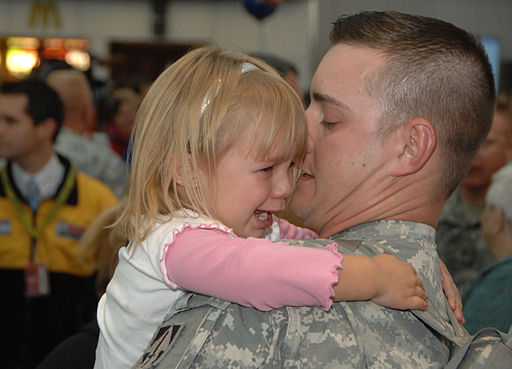 How many of your clients are veterans? Is that part of your standard assessment? If so, are you sure they tell you? Being a veteran has different meanings to different people. Some who served in the United States Armed forces don’t automatically respond to the term, so we have to ask different questions to identify and assess veterans.
How many of your clients are veterans? Is that part of your standard assessment? If so, are you sure they tell you? Being a veteran has different meanings to different people. Some who served in the United States Armed forces don’t automatically respond to the term, so we have to ask different questions to identify and assess veterans.
When I was younger, the term veteran brought up images of someone with a distinct look. The veterans I knew about were usually male, with a POW/MIA cap or shirt. Many also had the familiar red, yellow and green service ribbon fashioned into a bumper sticker on the back of a vehicle. Those are what could be called vocal veterans…they are proud of their service (rightfully so) and use that experience as a key factor in their public identity.
But what about the silent veterans? How do we find them? And for all veterans, how do we assess the impact that period of their lives has had on their overall self-image and level of functioning? One local court program asks everyone if they have ever served in the U.S. Armed Forces. This includes the Army, Navy, Air Force, Marines, Coast Guard, National Guard or any of the reserves.
This question gets beyond the vague and varied definitions of the term “veteran” and focuses instead on periods of service. Once you identify a client as a veteran, here are some general questions that need to be asked…as well as one that that shouldn’t. I’ve left specific questions about TBI and PTSD off the list, because I think we should screen all clients for both.
1. What type of discharge did you receive? There are several possibilities here, ranging from honorable, general under honorable conditions, other than honorable, bad conduct and dishonorable (there are some other less common). The experience surrounding discharge can be a significant clinical factor for many. Having an other than honorable or otherwise negative discharge can have a big impact on the person’s life, their view of self, and the ability to get help. Check out the post Other Than Honorable for more information.
>2. Have you ever been deployed? Being in the National Guard or reserves is no guarantee against deployment. Oklahoma has seen one of the highest rates of deployment of these forces. You also need to ask for details of the deployment because being deployed doesn’t always mean to a combat zone. And not being deployed doesn’t mean everything was peaceful. National Guard troops are routinely used in the rescue and cleanup from natural disasters and terrorists attacks.
3. What was your experience in the Military? You also can’t assume that life outside of a combat zone was all peaches and cream. Being separated from family and friends and everything else familiar can create a high level of stress. Being isolated on a ship or submarine may be significant for some. Remember, trauma is more about the response than the event. This is an incredibly broad and open question so the potential responses can vary widely.
4. What have been your experiences since coming home? Or more accurately, since returning to civilian life. Many went through periods of deployment with little noticeable disruption in mood or behavior. In fact, they may have thrived in the deployment situation, only to return home to a world that hadn’t changed and realizing they had. In fact, the inability to adapt post deployment may be the most likely reason we’re seeing the veteran in a civilian clinical setting.
5. What was your life like before you joined the Military? Hopefully, you’re already screening for childhood/developmental trauma and abuse. While it’s only anecdotal information, I’ve found many veterans with service related trauma who also have a history of childhood/developmental trauma. Perhaps those negative experiences drive many to seek the structure and stability of military life?
6. Did you see or experience things that continue to bother you? Some veterans may have considerable distress related to their experience that doesn’t show up as diagnosable on a screen for PTSD. The concept of Moral Injury is useful in identifying problems that don’t fit nicely into a DSM diagnosis. It’s helpful to remember that not all trauma results in the same set of neatly organized symptoms.
7. While you were in the military, did anyone threaten to or have unwanted sexual contact with you? Military Sexual Trauma (MST) may have been around for years but we are only just learning how widespread the problems are. Most importantly, don’t assume your male client isn’t a victim of MST. Recent research indicates high rates (often unreported) of MST among male service members.
And the question you shouldn’t ask:
1. Did you kill anyone? This is the primary questions veterans say you should never ask. The facts are, many of them did, many of them didn’t and some of them don’t know. Of those returning from Iraq in 2003/2004, over 50% reported directing fire at an enemy position. If your client did kill someone and/or sees this as a significant issue, it will come up in your discussions. Educate yourself about common justifications for killing in war. You may not agree with the justifications but it will allow you do communicate with the veteran in terms they already understand.
Of course this isn’t an exhaustive list and I would love to hear from others about areas I haven’t included. What else have you found to be important? Are there any other questions considered taboo? As always, I look forward to hearing from you and your experiences.



6 thoughts on “How to Assess Veterans: 7 Questions to Ask”
I would say “Did you kill anyone?” and “How was it over there?” are the two taboo. The first we understand immediately why it is taboo. The second question is often associated with asking someone about there vacation. War is no vacation. It also seems to be the backdoor question to get number one answered. I understand we are dealing with counselors and it is a little different behind closed doors, but these two questions asked in a public setting get my blood boiling.
Thanks for the input Jerron…and you’re right, we do have to ask some questions in a counseling setting that wouldn’t be asked in general conversation but even here, we need to be respectful and understanding.
Great post Daniel,
Why someone would ask the question about killing someone is beyond me. I have not had too much experience with the vets–but I know one thing. Whey they trust you enough to start talking I just set and listen and let them tell their story. God bless them.
Have we gone totally mad? Never ask such direct questions. What has happened to Motivational Interviewing a/o a Rogerian approach. Questions have to be open-ended or you will receive a defensive response. The trauma of an “In Country” deployment and experience is different for each conflict. If you have never been in the military and are of a similar age as your veteran patient you had better think about your counter-transference issues. Where were you, and what were you doing when your friends went to fight for their country? Remember what “Survivor Guilt” was like, even if you did not serve? There was a draft during the Vietnam War, and now we have a cross-service volunteer enlistment or an officer corps of ROTC and Military Academy graduates who put in their time serving their (our) country. If your “Boots have been on the ground, you have walked the walk, and can talk the talk.” Vets can easily pick up on your ambivalence by your non-verbal, uneasy presentation. There is a major difference between empathy, apathy, and sympathy, the latter of the three is hard to manage if you learn of comrades and young enemy civilian casulties lost in part due to your efforts in a combat situation.
I’m not sure what setting you work in but we routinely ask direct questions when screening and assessing clients. I understand the value of MI and Rogerian dialogue but most assessment instruments and screening tools are, by their nature, direct and closed. What I’m discussing here is a process of gaining specific information that can be relevant when working with a veteran population…not a course of therapy.
This is a great article. I come from a family of veterans and you would never know that any of us served in the military unless you explicitly asked us about it. Many veterans are proud and vocal about their service, but the ones you never notice are likely the ones you need to watch and may be struggling the most.
Comments are closed.